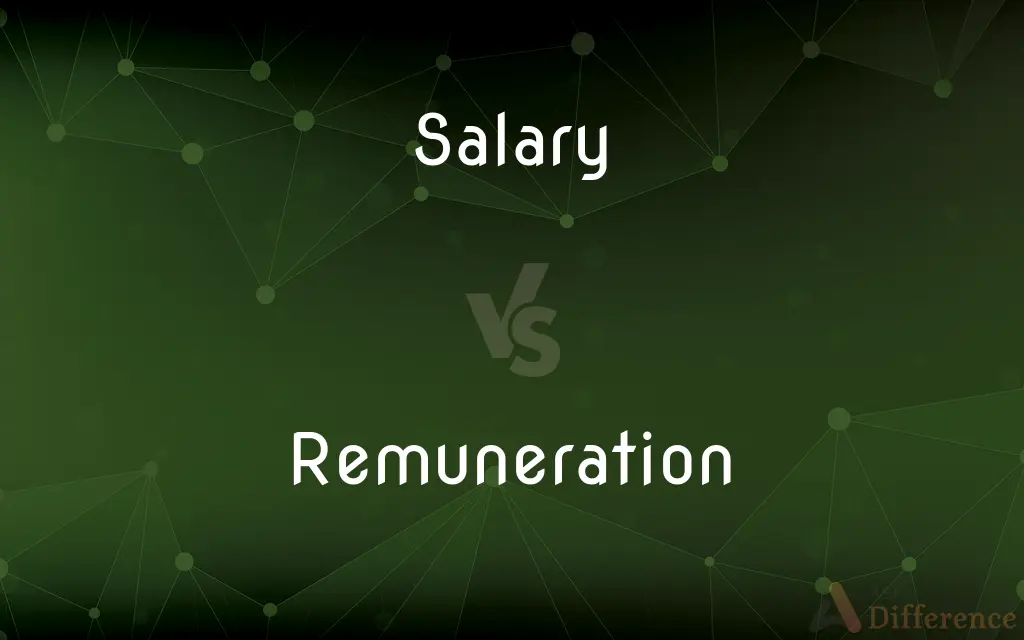Salary vs. Remuneration — What's the Difference?
By Tayyaba Rehman — Updated on November 4, 2023
Salary is fixed regular payment for employment, while remuneration is broader, including salary plus other benefits.

Difference Between Salary and Remuneration
Table of Contents
ADVERTISEMENT
Key Differences
Salary refers to a fixed, regular payment, typically expressed as an annual amount and paid in monthly or biweekly installments. It is compensation for professional services, often reflecting an employment contract. Remuneration, on the other hand, encompasses salary but also includes other forms of compensation such as bonuses, benefits, stock options, and commissions. It represents the total earnings an individual receives for their work.
The concept of salary is often associated with white-collar jobs, where individuals are paid a set amount regardless of the hours worked. Remuneration is a more inclusive term that not only covers the salary but also the additional monetary and non-monetary rewards that can be variable and performance-related. While a salary is expected to be consistent, components of remuneration can fluctuate based on company policy, individual performance, and negotiated agreements.
From a tax perspective, salary is often subject to consistent withholding and is reported as part of an individual’s income. Remuneration can affect tax liabilities differently, especially if it includes non-cash benefits or deferred compensation like stock options, which may be taxed at different rates or times. Salary is straightforward for budgeting and financial planning since it's predictable. Remuneration requires a more comprehensive view, considering the potential variability in total compensation.
In discussions of compensation packages, the salary is often the baseline figure considered for employment offers. Remuneration is a broader term used when discussing the complete compensation package during negotiations, which might be strategic in attracting or retaining talent. While the salary is a component of remuneration, the latter is the cumulative package that adds up to the total value an employee receives from their employer.
Comparison Chart
Definition
Fixed regular payment.
Total compensation package.
ADVERTISEMENT
Components
Monetary payment only.
Includes salary, bonuses, benefits.
Variability
Usually fixed.
Can be variable.
Associated With
Employment contract.
Total earnings from employment.
Reflection
Job position and contract.
Overall value of employment.
Compare with Definitions
Salary
Pay
He received a raise in his salary this year.
Remuneration
Earnings
His remuneration is performance-based.
Salary
Wages
Her salary is paid biweekly.
Remuneration
Payment
The CEO's remuneration is partly in stock options.
Salary
Earnings
The new job offered a higher salary.
Remuneration
Income
Consultants often receive varied remuneration.
Salary
Compensation
The salary for that position is competitive.
Remuneration
Wage
Her remuneration reflects her expertise.
Salary
A salary is a form of periodic payment from an employer to an employee, which may be specified in an employment contract. It is contrasted with piece wages, where each job, hour or other unit is paid separately, rather than on a periodic basis.
Remuneration
Compensation
Her remuneration includes health benefits.
Salary
A fixed regular payment, typically paid on a monthly basis but often expressed as an annual sum, made by an employer to an employee, especially a professional or white-collar worker
He received a salary of £24,000
A 15 per cent salary increase
Remuneration
Remuneration is the pay or other financial compensation provided in exchange for an employee's services performed (not to be confused with giving (away), or donating, or the act of providing to). A number of complementary benefits in addition to pay are increasingly popular remuneration mechanisms.
Salary
Pay a salary to
The Chinese system—salary the doctor and stop his pay when you get ill
Remuneration
The act of remunerating.
Salary
Fixed compensation for services, paid to a person on a regular basis.
Remuneration
Something, such as a payment, that remunerates.
Salary
A fixed amount of money paid to a worker, usually calculated on a monthly or annual basis, not hourly, as wages. Implies a degree of professionalism and/or autonomy.
Remuneration
Something given in exchange for goods or services rendered.
Salary
To pay on the basis of a period of a week or longer, especially to convert from another form of compensation.
Remuneration
A payment for work done; wages, salary, emolument.
Salary
(obsolete) Saline.
Remuneration
A recompense for a loss; compensation.
Salary
Saline
Remuneration
The act of remunerating.
Salary
The recompense or consideration paid, or stipulated to be paid, to a person at regular intervals for services; fixed wages, as by the year, quarter, or month; stipend; hire.
This is hire and salary, not revenge.
Remuneration
That which is given to remunerate; an equivalent given, as for services, loss, or sufferings.
Salary
To pay, or agree to pay, a salary to; to attach salary to; as, to salary a clerk; to salary a position.
Remuneration
Something that remunerates;
Wages were paid by check
He wasted his pay on drink
They saved a quarter of all their earnings
Salary
Something that remunerates;
Wages were paid by check
He wasted his pay on drink
They saved a quarter of all their earnings
Remuneration
The act of paying for goods or services or to recompense for losses;
Adequate remuneration for his work
Salary
Income
Their household salary supports their lifestyle.
Common Curiosities
How often is salary paid?
Salary is typically paid on a regular schedule, such as monthly or biweekly.
Is remuneration the same as salary?
No, remuneration includes salary and other forms of compensation.
What is salary?
Salary is the regular payment an employee receives for their work.
What does remuneration include?
Remuneration includes salary plus other benefits like bonuses and insurance.
Can remuneration be non-monetary?
Yes, remuneration can include non-monetary benefits like company cars.
Is remuneration only for high-level jobs?
No, remuneration applies to all levels of employment.
Are salaries standardized?
Salaries can be standardized within industries or companies but vary widely overall.
Can salary change frequently?
Salary is generally a fixed amount, though it can change with raises or promotions.
Are bonuses considered salary?
Bonuses are not salary; they are part of remuneration.
How is remuneration determined?
Remuneration is determined by job role, market rates, and individual negotiations.
Is salary always part of remuneration?
Yes, salary is a key component of remuneration.
Does remuneration vary by industry?
Yes, remuneration packages can vary widely across different industries.
Is salary confidential?
Salary is typically confidential between an employee and employer.
Can you negotiate remuneration?
Yes, remuneration is often negotiable.
Does remuneration affect job satisfaction?
Yes, fair remuneration is often linked to higher job satisfaction.
Share Your Discovery

Previous Comparison
Bicycle vs. Cycle
Next Comparison
Device vs. MachineAuthor Spotlight
Written by
Tayyaba RehmanTayyaba Rehman is a distinguished writer, currently serving as a primary contributor to askdifference.com. As a researcher in semantics and etymology, Tayyaba's passion for the complexity of languages and their distinctions has found a perfect home on the platform. Tayyaba delves into the intricacies of language, distinguishing between commonly confused words and phrases, thereby providing clarity for readers worldwide.














































